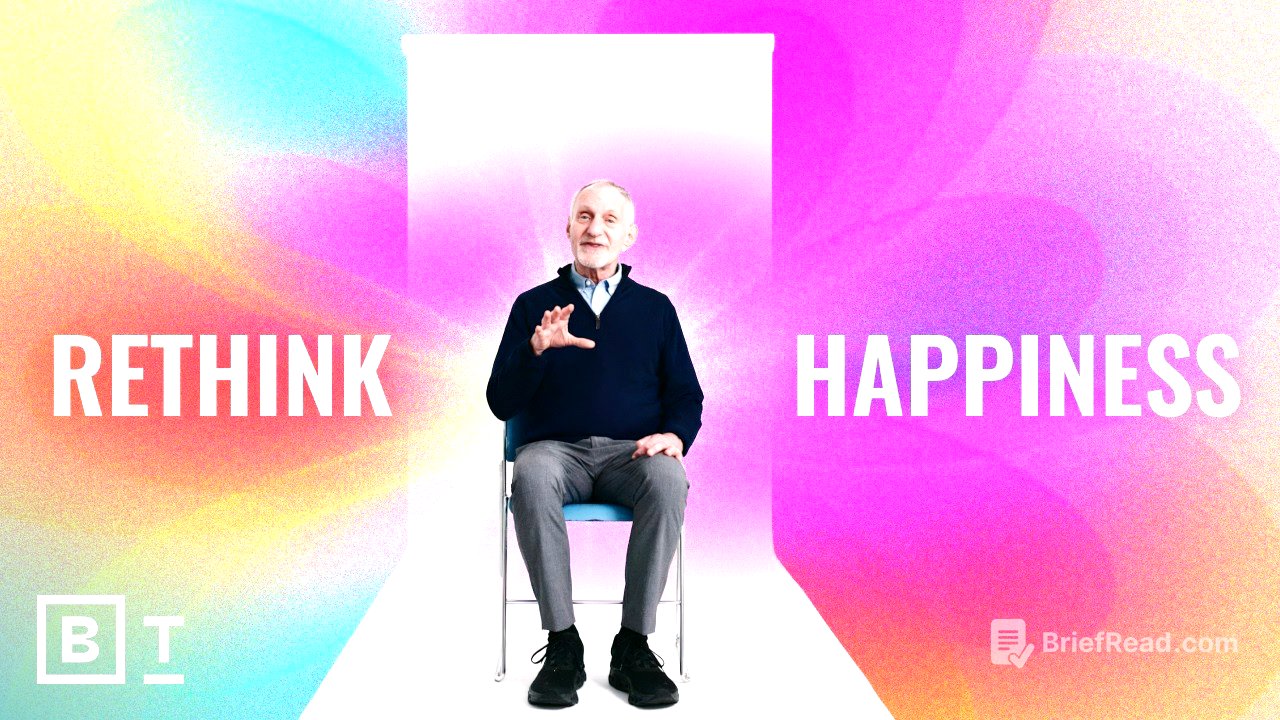TLDR;
This video explores the key factors influencing happiness and well-being, drawing from the 85-year Harvard Study of Adult Development. It highlights the importance of relationships, social fitness, and mindfulness in maintaining a fulfilling life. The discussion also covers strategies for managing loneliness and improving social connections, incorporating insights from Zen Buddhism.
- Relationships are crucial for happiness and health.
- Social fitness requires ongoing attention and effort.
- Mindfulness and Zen practices can improve relationships and reduce suffering.
- Loneliness is a growing epidemic with significant health consequences.
- Small, consistent actions can strengthen social connections and combat loneliness.
Part 1: Happiness. How did you get into psychiatry? [0:00]
Robert Waldinger discusses his unexpected path into psychiatry, driven by a fascination with how people's minds work. He found the variety in people's lives far more engaging than the repetitive nature of other medical fields. As the fourth director of the Harvard Study of Adult Development, he oversees the longest study of adult life, which began in 1938 with two distinct groups: Harvard sophomores and boys from disadvantaged Boston families. The study aims to understand what makes people thrive, focusing on the positive aspects of human development.
What is your research about? [1:05]
The Harvard Study of Adult Development investigates well-being throughout life, seeking the most impactful choice for sustained happiness and health. Contrary to popular belief, the study reveals that investing in relationships is the key. Those with the warmest connections live longer and healthier lives. The study, spanning 85 years, initially involved 724 young men and later included their wives and children, now encompassing over 2,000 individuals. Data collection methods have evolved from psychological and medical examinations to include DNA analysis, MRI scans, and stress response assessments, combining biological and psychological measures to understand the interplay between mind and body.
How much control do we have over our happiness? [5:35]
Psychologist Sonja Lyubomirsky estimates that approximately 50% of our happiness is determined by a biological set point, influenced by genes and inborn temperament. About 10% depends on current life circumstances, while the remaining 40% is within our control. This suggests that we can actively improve our happiness by cultivating a life that fosters it.
How do relationships affect happiness? [6:34]
When considering relationships, it's important to assess whether we have enough connection or too much, depending on individual needs. It's crucial to have warm, supportive relationships with people who have your back in emergencies. Relationships provide various benefits, including fun, practical assistance, and emotional support. Sharing worries with trusted individuals can significantly reduce feelings of isolation and improve overall well-being.
How do childhood experiences impact happiness? [8:43]
Childhood experiences significantly shape our expectations of the world. Positive, nurturing childhoods foster trust and security, while adverse experiences can lead to expectations that the world is unsafe and people are unreliable. However, positive adult relationships can counteract these negative childhood lessons, fostering trust and changing expectations. Disagreements are normal in important relationships, and addressing these difficulties can strengthen bonds. Connections with others help us navigate life's challenges, as evidenced by the study participants who relied on relationships during the Great Depression and World War II.
How does evolutionary biology influence our happiness? [11:44]
Humans evolved to be social animals, finding safety and security in groups, which promoted survival and gene transmission. Isolation is a stressor with biological and emotional roots. Loneliness triggers stress responses, suggesting a biological basis for our need for connection.
How do relationships impact physical health? [12:29]
Relationships affect physical health primarily through stress regulation. Stressful experiences trigger the body's fight or flight response, but supportive relationships help the body return to equilibrium. Without such support, chronic stress can lead to higher levels of stress hormones and inflammation, gradually harming body systems and increasing the risk of diseases like coronary artery disease and type 2 diabetes. Good relationships facilitate the exchange of positive emotions, helping maintain bodily equilibrium. Studies show that holding someone's hand during stressful procedures can keep the body closer to a healthy state.
What is social fitness? [17:18]
The happiest and healthiest individuals actively maintain their relationships by inviting people over, joining clubs, and staying connected with family and friends. This is seen as "social fitness," analogous to physical fitness, requiring ongoing effort. Small, consistent actions like texts, emails, phone calls, and in-person visits build vibrant social networks that enhance happiness and health.
How do I maintain healthy relationships? [17:55]
Maintaining healthy relationships involves consistent effort, similar to maintaining physical fitness. This includes regular communication through texts, emails, and phone calls, as well as making time for in-person visits. Paying attention to the frequency of contact with important people in your life helps build vibrant social networks that promote happiness and health.
How can I evaluate my social fitness? [18:49]
Assessing social fitness involves self-reflection on the quality and quantity of relationships. Mapping relationships through concentric circles can help visualise who is central and peripheral in your life, indicating whether the current social landscape feels adequate. If not, steps can be taken to adjust and improve it.
How does mapping my social universe contribute to my wellbeing? [20:16]
Mapping your social universe involves categorising relationships based on frequency and energy levels (energising vs. depleting). This can highlight relationships that drain energy despite frequent contact, or those that are energising despite infrequent contact. This analysis can guide decisions to modify relationships for improved well-being, focusing on interactions that promote openness, hope, and energy.
If a relationship is depleting, what should I do? [22:11]
When dealing with depleting relationships, consider reducing contact frequency or altering interactions to avoid draining subjects and activities. If reducing contact isn't possible, try to shift your perspective by remembering that everyone faces their own struggles. As a 19th-century minister said, "Be kind, for everyone you meet is fighting a great battle."
How many close friends do I need? [23:42]
The ideal number of friends varies from person to person, depending on individual needs and personality. Shy people may thrive with just a few close connections and derive energy from solitude, while extroverts may prefer a larger social circle. It's essential to determine what works best for you and cultivate your social world accordingly.
What is your study's primary discovery? [24:43]
Maintaining healthy relationships involves paying attention, being curious, and working through difficulties. Undivided attention is a valuable offering, often compromised by distractions from screens. Curiosity about long-term partners can reignite relationships by noticing new aspects and fostering fresh conversations. Working through disagreements to ensure both parties feel heard strengthens relationships. The good life is an ongoing process of change, requiring continuous care for relationships and oneself, and weathering unexpected challenges.
What is your background with Zen? [29:16]
Robert Waldinger is a Zen practitioner, an ordained Zen priest, and a Zen teacher (Roshi). He meditates daily and teaches meditation both in the United States and internationally. Zen practice significantly influences how he views his own life, the lives of others, his research, and his work with patients.
How does Zen shape relationships? [29:52]
Zen emphasises community (Sangha), where individuals learn about themselves and each other through relationships. This involves practicing with whatever arises, such as annoyance or joy, and observing how these emotions affect interactions. By accepting the messiness of our minds and recognising that everyone shares similar struggles, we develop compassion and acceptance towards ourselves and others.
What is the goal of Zen? [31:30]
The explicit goal of Zen is nothing; it is a practice. However, a side effect of this practice is waking up, which means understanding the truth of being alive, including the concept of impermanence. This understanding helps relieve suffering by recognising that everything is constantly changing, including ourselves.
Why is impermanence helpful to consider? [32:37]
Impermanence, the idea that everything is constantly changing, is a key concept in Zen Buddhism. It helps us understand that we have no fixed self or identity and that we are always in a process of change, connected to other changing people and things. This understanding can be both scary and liberating, as it allows us to let go of the stories we tell ourselves about who we are and how the world should be. Impermanence also helps us accept the ebb and flow of our experiences, recognising that emotions and situations are temporary.
How might the Four Noble Truths improve relationships? [34:53]
The Four Noble Truths begin with the acknowledgment that life is unsatisfactory, with inevitable aspects we dislike. The source of suffering is greed, aversion, and ignorance. Suffering can be relieved through the Eightfold Path. Zen teaches that unsatisfactoriness is always present, and while we have preferences, we can learn to cling to them less tightly. This involves accepting others as they are and reducing the insistence that they conform to our expectations, which ultimately reduces suffering in relationships.
How does understanding attachment help guide my relationships? [37:51]
Buddhism views attachment not merely as connection but as tightly holding onto fixed views. Letting go of these fixed views is essential.
How does a "beginner's mind" benefit my relationships? [38:17]
Beginner's mind involves letting go of preconceived notions and being open to new possibilities. As Shunryu Suzuki said, "In the beginner's mind, there are many possibilities; in the expert's mind, there are few." This openness allows for curiosity and fresh interactions, preventing relationships from becoming stale.
What is mindfulness and how do I cultivate it? [39:55]
Mindfulness is paying attention in the present moment without judgment. It involves being open to all experiences, expanding awareness beyond thinking to encompass everything happening around us. Mindfulness can be practiced anytime, anywhere, by simply paying attention to the stimuli reaching you, such as your heartbeat, breath, or the sounds around you.
How does recognizing suffering improve relationships? [42:19]
Being mindful of our own suffering helps us differentiate between internal and external sources of discomfort, making us less likely to blame others for our feelings. It also fosters empathy by recognising that everyone experiences suffering, allowing us to offer understanding and compassion rather than annoyance.
How does "metta" aid relationships? [43:00]
Metta, or loving-kindness, can be cultivated through meditation by focusing on another person and wishing them peace and happiness. Awareness of our own pain and difficulties naturally fosters empathy, allowing us to respond to others with compassion rather than immediate anger.
What is enlightenment? [44:31]
Enlightenment, in Zen, involves waking up to the truth of life, particularly the interconnectedness and oneness of everything. While enlightenment experiences can occur, they are not permanent. As the book title "After the Ecstasy, the Laundry" suggests, life returns to everyday tasks. Shunryu Suzuki emphasised that there is no such thing as an enlightened person, only enlightened activity, focusing on compassionate actions in each moment rather than pursuing a self-improvement project.
Do we have a loneliness epidemic? [50:31]
Loneliness is a growing epidemic, increasing since the 1950s due to social dislocation and increased mobility, which disrupt established networks. The rise of screens, starting with television, has further contributed to disconnection by diverting attention away from community engagement and personal interactions. Studies indicate that a significant percentage of people, ranging from 30% to 60%, report feeling lonely much of the time, with young adults being the loneliest age group.
What’s the difference between loneliness and isolation? [53:26]
Loneliness is the subjective feeling of being less connected than desired, while isolation is the objective state of being alone. One can be lonely in a crowd or content in solitude. Isolation may or may not include loneliness, depending on individual feelings and desires.
How does loneliness harm us physically? [54:27]
Loneliness and social isolation are stressors that put the body in a chronic, low-level fight or flight mode, leading to higher levels of stress hormones and inflammation. This can break down body systems, increasing the risk of coronary artery disease and other health problems. Research suggests that loneliness is as dangerous to health as smoking half a pack of cigarettes a day or being obese.
What fundamental need do relationships satisfy? [56:12]
Relationships satisfy the fundamental need to feel like we belong and matter to others. This sense of mattering is often experienced when our presence is appreciated, our ideas are heard, and we are acknowledged in a friendly way. Even small interactions, such as a friendly exchange with a barista, can provide hits of well-being and reinforce our sense of connection.
Is our happiness only dictated by our close connections? [58:27]
Happiness is not solely dictated by close relationships; casual encounters also contribute to our sense of connection and well-being. Pleasant interactions with mail carriers, cashiers, and others can provide small but significant hits of connection. Making these interactions more personal, such as using people's names and showing genuine interest, can enhance both their sense of belonging and our own.
What can I do to lessen loneliness? [1:01:07]
To combat loneliness, engage in activities you care about alongside others, such as volunteering or joining clubs. This provides opportunities for repeated casual encounters and shared interests, facilitating new relationships. Finding ways to be of service can also foster connections, as can making gestures that signal openness to connection, even when feeling afraid. Cognitive behaviour therapy can help revise assumptions about not being wanted and develop social skills.









